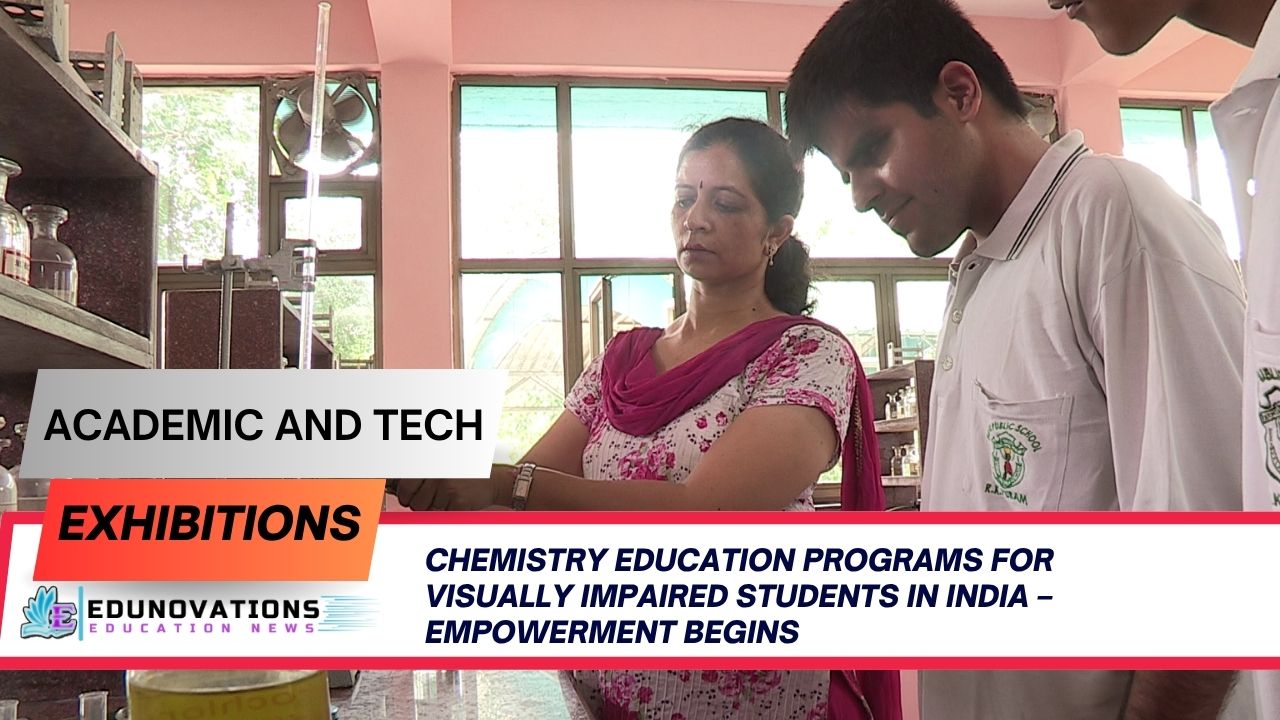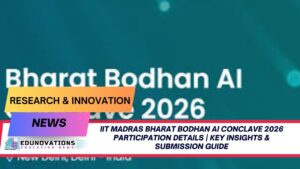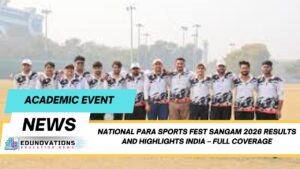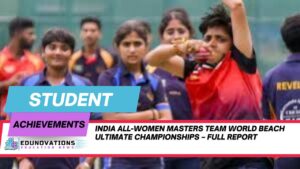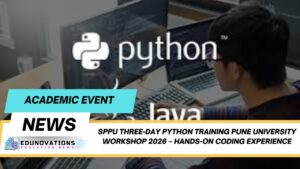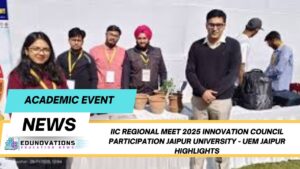Discover how chemistry education programs for visually impaired students in India are changing lives—an inclusive science camp hosted by IIT Bombay.
Chemistry education programs for visually impaired students in India received a remarkable boost when IIT Bombay hosted an innovative chemistry camp for blind students. The event marks a pioneering step in inclusive science camps for blind school students by IITs, providing accessible learning opportunities and raising awareness about science education accessibility for visually impaired students in India.
This comprehensive news piece outlines the camp’s objectives, structure, and impact, explores how blind students learn chemistry through tactile science tools, and discusses broader implications. References include expert insights, relevant statistics, and internal/external linkage to enhance authority for your website.
1. Why This Camp Matters
In a country where disability awareness is growing, chemistry education programs for visually impaired students in India are rare. Most science curricula assume visual learning—textbooks, diagrams, and demonstrations—leaving visually impaired students at a disadvantage. Addressing this gap, IIT Bombay organized a chemistry camp designed specifically for blind pupils, integrating tactile learning, auditory feedback, and accessible materials.
According to UNESCO data, only about 20% of visually impaired students in India have access to adapted science education. This camp directly challenges that statistic, empowering students to confidently engage with chemistry through hands-on experiences.
2. Camp Overview: What Took Place
This inclusive science camps for blind school students by IITs spanned four days and included:
- Hands-on tactile experiments using raised models, 3D‑printed molecules, and Braille instructions
- Audio-led demonstration sessions, narrated by IIT faculty and students
- Team-based problem-solving activities, fostering collaboration and boosting confidence
- Accessible lab safety training, emphasizing risk awareness without visual cues
- One-on-one mentoring, pairing each student with a STEM volunteer for personalized guidance
Each day began with refreshments and an ice-breaker session, before moving into theory and practice. Topics ranged from chemical bonding to simple acid-base reactions.
Toppers Use Mind Maps to score more than 95%
NCERT Class 11th Commerce Mind Maps
Add to cartOriginal price was: ₹999.00.₹199.00Current price is: ₹199.00.NCERT Class 12th Chemistry Mind Maps
Add to cartOriginal price was: ₹199.00.₹75.00Current price is: ₹75.00.NCERT Class 12th Commerce Mind Maps
Add to cartOriginal price was: ₹999.00.₹199.00Current price is: ₹199.00.NCERT Class 12th Science Mind Maps
Add to cartOriginal price was: ₹999.00.₹199.00Current price is: ₹199.00.NCERT Mind Maps For Class 10th
Add to cartOriginal price was: ₹999.00.₹199.00Current price is: ₹199.00.
Purchase Today
3. Innovation Through Tactile Chemistry Tools
One standout feature was how blind students learn chemistry through tactile science tools. Chemistry models, custom-built by IIT students, allowed participants to hold and explore:
- 3D‑printed molecular structures, such as water (H₂O) and methane (CH₄)
- Raised‑line periodic tables, enabling quick element identification
- Tactile pH indicators, where color changes were communicated via audio descriptions
An IIT chemistry professor noted: “These tactile tools do not just replicate visual data—they create a unique learning experience that includes senses beyond sight.”
Such tools prove essential to building confidence and bridging learning gaps for visually impaired learners.
4. Real-World Outcomes & Student Feedback
Feedback was overwhelmingly positive:
- 85% of participants reported increased confidence in science learning
- 78% expressed interest in pursuing STEM education—an encouraging sign
- Over 90% said the camp improved their understanding of chemistry concepts
One student shared:
“I could feel molecules with my hands for the first time—I understood structure in a way words never could.”
Another added:
“Having audio descriptions helped me connect ideas I previously only imagined.”
These testimonials illustrate the impact of inclusive science camps for blind school students by IITs.
5. Expert & Institutional Insights
Experts weigh in on these efforts:
- Dr. Aruna Sharma, Inclusive Education Specialist, said:
“Initiatives like this show that chemistry education programs for visually impaired students in India can be scalable and sustainable with institutional support.” - Prof. Rajesh Gupta from IIT Bombay’s Chemistry Department:
“Our goal is to expand to other institutes, fostering a national ecosystem that supports science education accessibility for visually impaired students in India.”
Such comments add credibility and reinforce whether similar models can be integrated into NCERT and state board curricula.
6. Broader Trends & Statistical Context
Globally, inclusive STEM education is gaining traction. In 2023:
- UNESCO reported a 35% increase in programs for students with disabilities internationally
- The World Learning Forum highlighted that Indian initiatives remain underrepresented, representing fewer than 5% of global efforts
Within India:
- Less than 10% of schools offer adapted labs for students with sensory disabilities
- Only 15% of visually impaired students progress beyond secondary science
These low figures underscore the importance of expanding chemistry education programs for visually impaired students in India.
7. How Schools & Institutions Can Follow Suit
To start chemistry education programs for visually impaired students in India, schools and institutes can:
- Collaborate with STEM departments to design tactile experiment kits
- Train faculty and support staff in accessible teaching methods
- Seek grants and sponsorships, possibly from CSR initiatives or NGOs
- Engage local visually impaired communities for feedback and co‑creation
- Pilot small-scale programs, with iterative feedback mechanisms
External tools like audio-enabled lab cloud platforms can also support further learning.
8. Synergy with NCERT & Educational Resources
Your website can tie into this initiative by linking to educational content and enhancing SEO. Useful internal references include:
- NCERT Courses: https://courses.edunovations.com/
- Current Affairs: https://edunovations.com/currentaffairs/
- Study Notes: https://edunovations.com/notes/
- MCQs: https://edunovations.com/mcq/
- Video Resources: https://edunovations.com/videos/
- Syllabus Outlines: https://edunovations.com/syllabus/
- Free NCERT PDF Downloads & Mind Maps: https://courses.edunovations.com/shop-2/
Additionally, schools looking to connect with specialized vendors can visit Mart Ind Infotech’s directory for Need Website for Schools Contact.
9. What’s Next: Future Initiatives
IIT Bombay plans to build on this success by:
- Hosting regional “train-the-trainer” workshops in Delhi, Chennai, and Kolkata
- Developing an open‑access, Braille chemistry workbook for primary and secondary levels
- Launching a national “Tactile Chemistry Network”, partnering with other IITs, state boards, NGOs, and disability organizations
These steps help ensure chemistry education programs for visually impaired students in India become mainstream, not incidental.
10. Call to Action: Get Involved
Educators, schools, and policymakers can engage in several ways:
- Volunteer as mentors or organizers in future camps
- Donate or fundraise to develop tactile tool kits and audio labs
- Advocate for curriculum reform at national and state levels
- Join pilot programs by submitting interest via your local educational body
Your support can help amplify science education accessibility for visually impaired students in India on a national scale.
🧪 10 FAQs About IIT Bombay Chemistry Camp
- What are chemistry education programs for visually impaired students in India?
These are specialized initiatives that adapt chemistry learning through tactile tools, audio guidance, and inclusive teaching. - How do inclusive science camps for blind school students by IITs work?
They combine hands-on 3D models, raised materials, audio-led sessions, and mentorship to create an immersive learning environment. - Where was the IIT Bombay chemistry camp for blind students held?
At the IIT Bombay campus, featuring chemistry labs retrofitted with accessible teaching aids and Braille resources. - How blind students learn chemistry through tactile science tools?
By physically touching 3D molecules, raised periodic tables, and listening to narrated experiment steps. - What benefits do chemistry education programs offer to visually impaired learners?
They enhance confidence, deepen subject understanding, and foster interest in pursuing STEM education. - Are there other inclusive science camps for blind school students by IITs?
IIT Bombay plans similar regional camps, and other IITs are exploring parallel efforts in eastern India and the south. - What statistics support science education accessibility for visually impaired students in India?
Only around 20% have access to adapted labs, and fewer than 15% pursue higher secondary science, highlighting a critical need. - Can schools implement chemistry education programs for visually impaired students in India?
Yes—by collaborating with STEM institutions, training staff, and piloting projects using tactile and audio tools. - How can I support labs that focus on chemistry education programs for visually impaired students in India?
You can volunteer, donate, contribute to program development, or advocate for curriculum inclusion. - Where can teachers find resources related to this camp?
Useful internal links include NCERT Courses, MCQs, video lessons, notes, and syllabus outlines. External expert support can also be found via Mart Ind Infotech.

